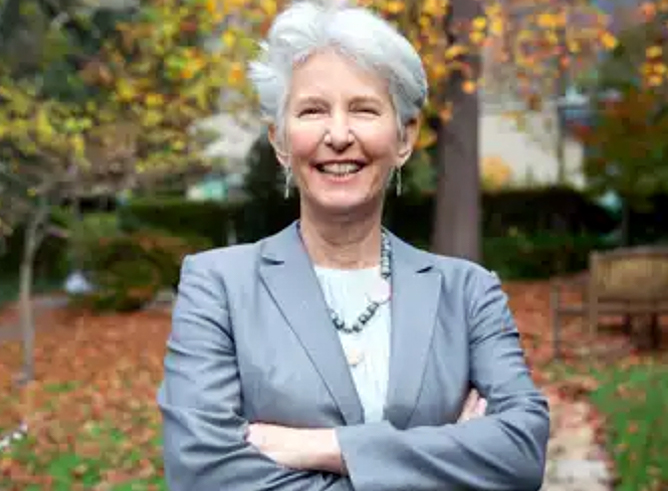It is fantastic to see Cyndy recognized with the Cotton Medal for her work in surface chemistry and catalysis. Al Cotton was always a huge supporter of physical chemistry, and as one of the foremost surface scientists in the world, Cyndy is so deserving of this award. Having been a postdoctoral fellow with her, I can attest that she is not only an exceptional scientist, but also a wonderful teacher and mentor.

Dr. Cynthia Friend, T.W. Richards Professor of Chemistry and Professor of Materials Science at Harvard University and current president of The Kavli Foundation, has been selected as the 2022 recipient of the F.A. Cotton Medal for Excellence in Chemical Research named for one of the most honored faculty members in Texas A&M University history.
The medal is jointly awarded each year by the Texas A&M Department of Chemistry and the Texas A&M Section of the American Chemical Society (ACS) in tribute to Dr. Albert Cotton, a Texas A&M distinguished professor of chemistry widely considered one of the world’s foremost inorganic chemists who passed away on February 20, 2007. He was the inaugural recipient of the medal when it was first awarded in 1995.
Friend will be honored during an afternoon symposium set for Friday, April 22, within the Stephen W. Hawking Auditorium on the Texas A&M campus. In addition to Friend’s 4:30 p.m. keynote presentation, the event will feature preceding talks by Harvard chemist Robert Madix and Wesleyan University chemist Michelle Personick. The symposium will be followed by an invitation-only dinner, at which Friend will be presented with the Cotton Medal.
Friend assumed the Kavli Foundation presidency in January and has since been on leave from Harvard, where she has been a faculty member since 1982 after earning her Ph.D. from the University of California, Berkeley in 1981. She graduated from the University of California, Davis in 1977 with a degree in chemistry and was a postdoctoral fellow in chemical engineering at Stanford University.
Friend was the first female chair and the first female professor in chemistry at Harvard, where her research group focuses on addressing global challenges in reducing energy costs and in developing alternative energy sources. She has published more than 300 papers and served as a research advisor for more than 75 graduate students and postdoctoral researchers as well as a staunch advocate for diversity and excellence in scientific research and teaching through her leadership.
Prior to taking on the Kavli Foundation presidency, Friend served as director of the IMASC Energy Frontier Research Center at Harvard, which focuses on sustainable production of chemicals. In addition, she was chair of the U.S. Department of Energy Basic Energy Sciences Advisory Committee (BESAC) as well as a member of Bruker Instruments Corporation Board of Directors. Previously, she was director of the Rowland Institute, an associate dean in the Faculty of Arts and Sciences, and chair of the Department of Chemistry and Chemical Biology at Harvard. Friend also was the associate director for the Photon Sciences Directorate of SLAC National Laboratory at Stanford from 2011 to 2012.
Friend is a fellow of the National Academy of Sciences, American Academy of Arts and Sciences, American Association for the Advancement of Science and American Chemical Society (ACS). In addition to receiving a 2007 Humboldt Senior Research Fellowship, she has been honored with three previous national ACS awards: the 2017 Award in Surface Chemistry, the 2009 George Olah Award in Hydrocarbon Chemistry and the 1991 Garvan Medal.
“It is fantastic to see Cyndy recognized with the Cotton Medal for her work in surface chemistry and catalysis,” said Dr. James D. Batteas, Regents Professor of Chemistry and D. Wayne Goodman Professor of Chemistry at Texas A&M. “Al Cotton was always a huge supporter of physical chemistry, and as one of the foremost surface scientists in the world, Cyndy is so deserving of this award. Having been a postdoctoral fellow with her, I can attest that she is not only an exceptional scientist, but also a wonderful teacher and mentor.”
Cotton came to Texas A&M as the Robert A. Welch Distinguished Professor of Chemistry at Texas A&M University in 1972 from MIT, where at age 31 in 1961, he had become the youngest MIT faculty member to attain the rank of full professor. His pioneering 35-year career at Texas A&M revolutionized several fields of chemistry, including inorganic chemistry, protein chemistry, structural chemistry and chemical bonding. Cotton was the originator of and leading authority in the field of compounds containing single and multiple bonds between metal atoms. His other principal contributions dealt with protein structure, spectroscopic studies of metal carbonyls, and the dynamic behavior of fluxional organometallic and metal carbonyl compounds.
For more information about the event, contact Texas A&M Chemistry at (979) 845-9829 or via email at chemhead@chem.tamu.edu.
Learn more about Friend and her remarkable career and backstory via Harvard’s 2020 announcement of her Kavli Foundation presidency.
# # # # # # # # # #
About Research at Texas A&M University: As one of the world’s leading research institutions, Texas A&M is at the forefront in making significant contributions to scholarship and discovery, including in science and technology. Research conducted at Texas A&M generated annual expenditures of more than $1.13 billion in fiscal year 2020 and ranked 14th in the National Science Foundation’s Higher Education Research and Development Survey. Texas A&M’s research creates new knowledge that provides basic, fundamental and applied contributions resulting, in many cases, in economic benefits to the state, nation and world. To learn more, visit Research@Texas A&M.
